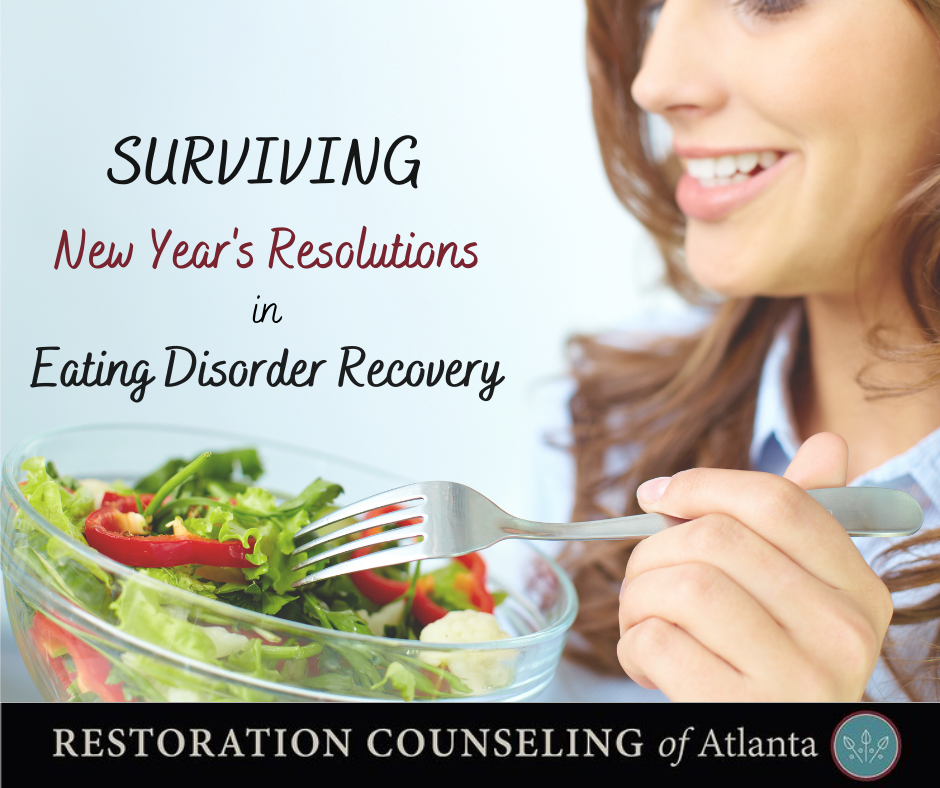A new year is here, and with it often comes New Year’s resolutions. The month of January offers a natural time to reflect on the last year of our lives and set intentions for the upcoming one. But with most resolutions focused on dieting and fitness, this can be an incredibly triggering time for those struggling with an eating disorder. These goals put a disproportionate emphasis on appearance and weight, and keep us stuck in destructive definitions of “health.” The diet industry also uses this time to define our definition of health and, consequently, worth. These messages, along with all of the other daily ones around us, can be a huge setback for those on the road to recovery.
The Eating Disorder’s Voice
It can be really tough to distinguish the eating disorder’s voice from your own at this time of the year. Since they might sound similar, I want to offer some ideas of what it may be telling you right now:
1. “I must make up for my holiday indulgence.”
The eating disorder loves to remind people that nourishing themselves comes with contingencies. For example, “Because I worked out this morning, I can eat a snack.” “I must skip lunch since I ate a full breakfast.” But January is unique in that it falls after the holiday season, where an increase in gatherings means access to various kinds of food. The eating disorder labels the holiday season as a “cheat” month, which means that it must make up for indulging by restricting in January. But this is not true. We ultimately give our bodies food because they deserve food. The holidays can be a helpful reminder to be flexible with food choices and remind yourself to keep the labels “healthy” and “unhealthy” out of your vocabulary. You do not have to apologize for eating by depriving your body later on.
2. “Health is a normal thing to focus on this time of year – there’s nothing wrong with it.”
It is incredibly difficult to hear all of your loved ones talk about their health goals. The eating disorder loves to use this time to blend in. If everyone is focused on health, the eating disorder looks like it naturally belongs. I want to remind you that your definition of health looks different – and dare I say, healthier than the larger culture. Do not let the eating disorder twist what healthy means for you. Each day you listen to your body and give it what it needs, you are focusing on health.
3. “Setting standards for myself and the new year is necessary for success.”
This is true in some ways. Goals keep us moving forward and we all benefit when we are working towards something. However, the eating disorder has a way of taking goals and making them rigid rules for you to live by. It then tells you that because you are not meeting them, you are a failure. If the goals you set for yourself sound rigid, are unachievable, or keep you stuck in black/white thinking, your eating disorder is driving the ship. Take a step back from those goals and ask yourself: How can I focus on the process of growth vs. the goals themselves?
4. “Everyone is going to be in a better place than me if I’m the only one not dieting.”
This time of the year is full of triggers as you watch those around you trying new diets, starting gym memberships, or downloading calorie-counting apps. It can be hard to feel like you are the only one not focusing on weight loss. But comparison often gives the eating disorder the fuel that it needs to stay around. When you start to focus on those around you and the goals they are setting, remind yourself of the progress you have made in your recovery process. Every small step is worth celebrating. You are in a better place by choosing recovery.
Reclaiming Your Voice
The eating disorder does not get the final word. You have been on the journey of recovery, and you get to keep choosing to heal. So let’s use that journey as a stepping stone to creating more honoring intentions for the year. Start right where you are in the healing process and ask yourself: where do I want to be in a year from now? What are the small steps I can take now to get there?
Here are some questions to reflect on along the way:
- What are ways I want to continue listening to my body and its needs?
- How can I practice being more compassionate to myself this year?
- What are the daily steps I need to take to keep focusing on recovery?
- How can I challenge the false messages about myself and my body?
- What Spiritual disciplines can I lean into more this year?
- What truths am I missing about who God made me to be?
- Who can I rely on as a support system – and what gets in the way of letting them in?
- How can I begin trusting my body more?
- What Scriptures do I want to meditate on this year?
- What relationships do I want to grow this year? Which ones do I need to reevaluate?
And remember, you have come this far already. The eating disorder doesn’t get to be in charge of your New Year’s resolutions. Keep reclaiming your voice as you continue your recovery journey this year.
If you would like to set intentions for the year and are struggling with where to start, I have included printable PDFs that include some of these questions to help. You can find them linked below.

Written by Haley DePrato

